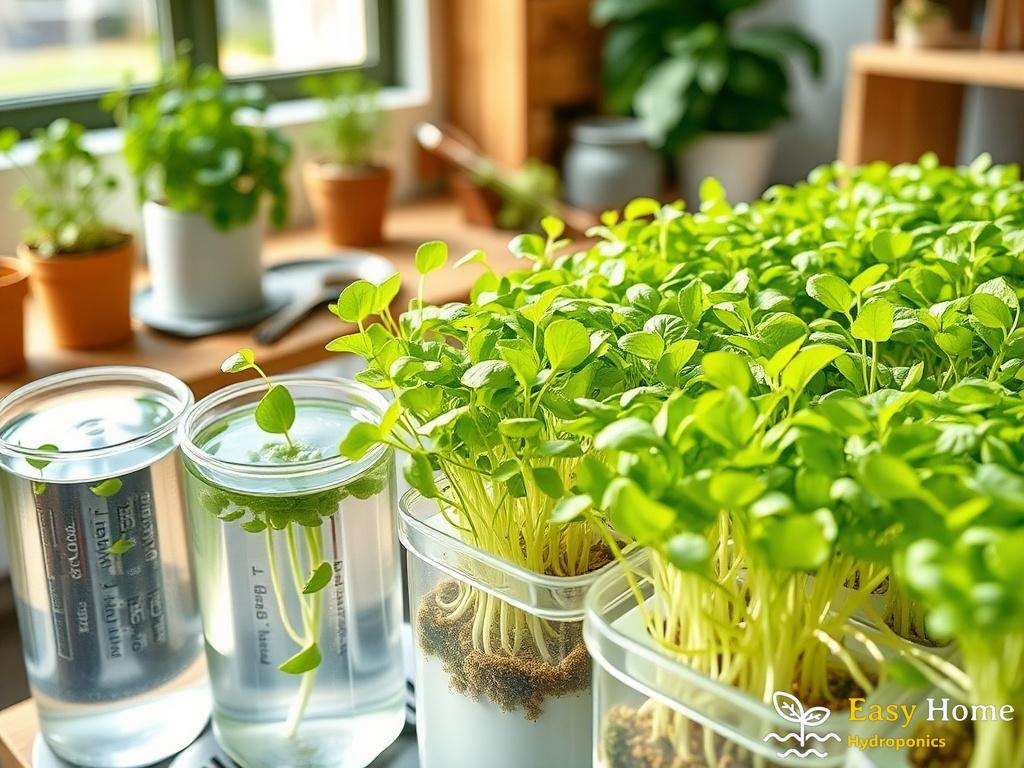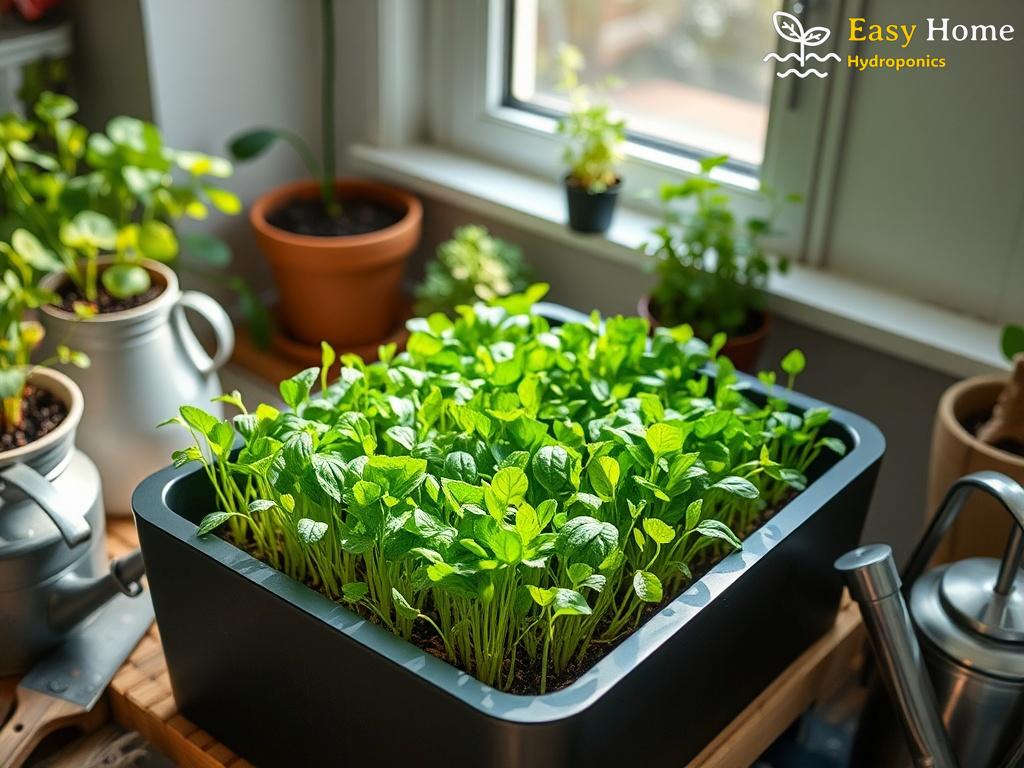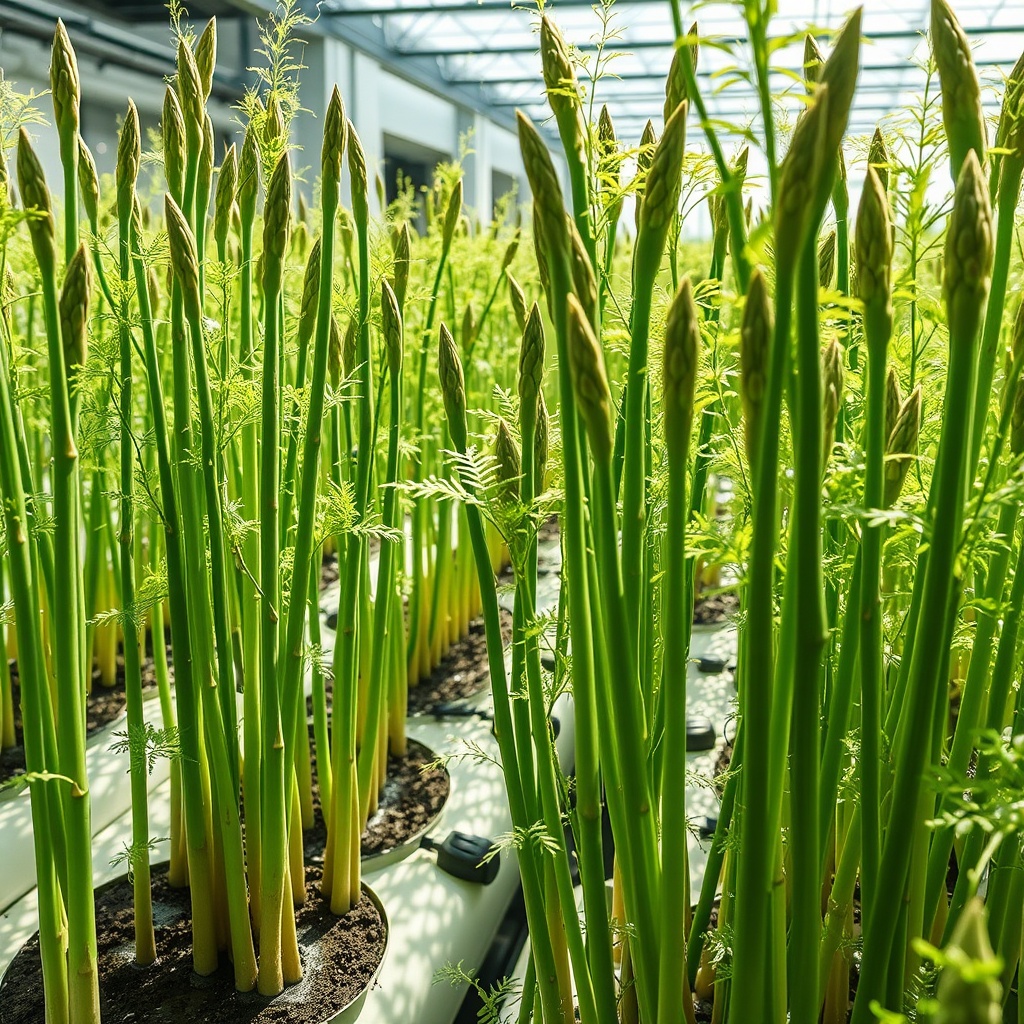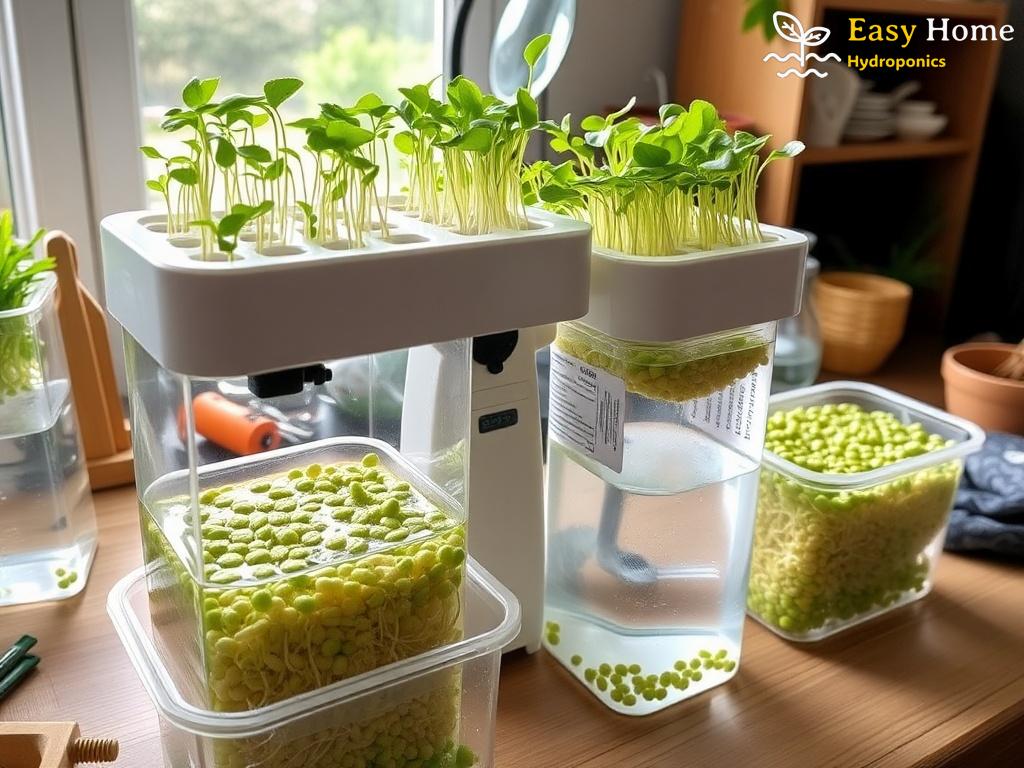The Magic of Hydroponic Alfalfa

Imagine having a garden that thrives without soil, where the green goodness of alfalfa sprouts can be cultivated right in your kitchen. Hydroponic alfalfa is not just a trend; it’s a revolutionary approach to growing nutrient-dense food at home. With its rich flavor and impressive health benefits, alfalfa is a powerhouse of nutrition that can elevate any meal. Let’s dive into the enchanting world of hydroponic alfalfa and uncover its myriad advantages.
Hydroponic growing methods allow plants to absorb nutrients directly through their roots, making the process more efficient and productive. This method cultivates alfalfa sprouts that are not only fresher but also packed with essential vitamins and minerals. Here’s why hydroponic alfalfa is a game-changer:
- Nutrient Density: Hydroponic alfalfa offers a concentrated source of vitamins A, C, E, and K, along with significant amounts of calcium, magnesium, and iron.
- Fast Growth: Alfalfa sprouts can be ready in as little as 7 days, allowing you to enjoy fresh greens in no time.
- Sustainable Practice: This method uses less water compared to traditional farming, making it an eco-friendly option.
The benefits of hydroponic alfalfa extend beyond mere nutrition. The ability to grow these sprouts indoors means that you can enjoy fresh produce year-round, regardless of the weather outside.
Growing hydroponic alfalfa at home is easier than you might think. With just a few materials and some patience, you can create your own mini hydroponic system. Here’s a straightforward guide to get you started:
- Gather materials: You’ll need alfalfa seeds, a shallow tray, water, and a growing medium like coconut coir or rock wool.
- Prepare the seeds: Soak alfalfa seeds in water for about 6-8 hours to initiate germination.
- Set up your tray: Place the growing medium in the tray and evenly scatter the soaked seeds across the surface.
- Water and cover: Gently mist the seeds with water and cover the tray with a lid or cloth to maintain humidity.
- Monitor and harvest: After 5-7 days, your sprouts will be ready to harvest! Simply cut them at the base and enjoy.
This simple process allows anyone to experience the joys of home gardening, even in small spaces. The magic of hydroponic alfalfa is not just in its growth; it’s in the health benefits it brings to your table.
Step-by-Step Guide to Growing Sprouts
Growing your own hydroponic alfalfa sprouts at home can be a rewarding experience, providing not only a fresh food source but also a way to connect with nature, even within the confines of your kitchen. The process is straightforward yet fascinating, offering a glimpse into the world of modern gardening techniques that eschew traditional soil methods. By following a few essential steps, you can unlock the full potential of these nutrient-dense sprouts.
Before you embark on your hydroponic alfalfa journey, it’s crucial to gather all necessary materials. Having everything at hand will streamline the process and make it enjoyable. You will need quality alfalfa seeds, a shallow tray for germination, clean water, and an appropriate growing medium such as coconut coir or rock wool. Once you have your supplies, the first step involves preparing the seeds. Soaking them in water for 6-8 hours is essential as it kick-starts the germination process, ensuring robust growth.
After soaking, it’s time to create an optimal environment for your sprouts to flourish. Place the chosen growing medium into your tray, making sure it’s evenly distributed. This medium serves as a foundation for the seeds, allowing them to absorb moisture and nutrients effectively. Next, scatter the soaked seeds across the surface of the growing medium, ensuring they are spaced out appropriately to allow for growth. A gentle misting with water will hydrate the seeds further. Cover your tray with a lid or cloth to maintain humidity, which is crucial during the early stages of sprout development.
As the days go by, you will witness the magic of growth. Hydroponic alfalfa sprouts typically sprout within 5-7 days, turning your initial efforts into delightful green shoots. It’s essential to monitor their progress, ensuring they remain damp but not overly saturated. Once they reach a height of around 1-2 inches, it’s time to harvest them. Simply cut the sprouts at the base and rinse them under cool water to remove any residue.
The satisfaction of growing your own hydroponic alfalfa sprouts cannot be overstated. Not only do they add a burst of flavor and nutrition to your meals, but they also serve as a testament to your gardening prowess, all achieved without the need for soil. With each harvest, you are not just feeding your body; you are nurturing a new hobby that can enhance your culinary experiences and promote sustainable living.
Nutritional Benefits of Alfalfa Sprouts
When it comes to superfoods, alfalfa sprouts stand out as a hidden gem packed with nutritional benefits. These tiny green sprouts may seem modest in appearance, but they bring a wealth of nutrients that can significantly enhance your diet. Cultivating them hydroponically not only ensures their freshness but also maximizes their health benefits, making them a perfect addition to your meals.
Rich in essential vitamins and minerals, alfalfa sprouts are a powerhouse of nutrition. They are particularly renowned for their high content of vitamins A, C, E, and K. Each of these vitamins plays a distinct role in maintaining optimal health. For instance, vitamin K is crucial for bone health, while vitamin C is a potent antioxidant that boosts the immune system. Moreover, alfalfa sprouts are a rich source of minerals such as calcium and magnesium, which are vital for maintaining strong bones and overall metabolic functions.
What makes alfalfa sprouts particularly unique is their impressive nutrient density combined with their low-calorie content. This means you can indulge in them without worrying about excess calories, making them an ideal food for weight management. The protein content in these sprouts also adds to their appeal. Rich in amino acids, they provide a plant-based protein source that supports muscle health and can be a great addition for vegetarians and vegans.
Moreover, alfalfa sprouts are renowned for their fiber content, which aids in digestion and promotes gut health. This fiber not only helps regulate bowel movements but also keeps you feeling full longer, making it easier to maintain a healthy weight. Interestingly, they also contain phytoestrogens, which can help balance hormones in the body. This unique property makes alfalfa sprouts beneficial for women, particularly during menopause.
To fully appreciate the nutritional benefits of hydroponic alfalfa sprouts, it’s helpful to compare them with other popular greens. In a side-by-side analysis, alfalfa sprouts outshine many leafy greens in terms of nutrient density. For example, when compared to broccoli, alfalfa sprouts contain higher levels of vitamins C and K. They also boast a significant amount of iron, surpassing that of spinach, making them a superior choice for those looking to increase their iron intake.
| Nutrient | Alfalfa Sprouts (per 100g) | Broccoli (per 100g) | Spinach (per 100g) |
|---|---|---|---|
| Vitamin C | 24 mg | 89 mg | 28 mg |
| Vitamin K | 30.6 mcg | 101.6 mcg | 483 mcg |
| Iron | 0.57 mg | 0.73 mg | 2.71 mg |
This nutritional comparison highlights the significant health benefits of incorporating hydroponic alfalfa sprouts into your diet. By choosing these vibrant sprouts, you are not only enhancing the flavor of your meals but also supercharging your health with essential nutrients.
Common Mistakes in Hydroponic Growing
While growing hydroponic alfalfa can be an exciting and rewarding venture, many novice gardeners fall prey to a variety of common pitfalls that can hinder their success. Understanding these mistakes and how to avoid them can make a significant difference in the quality and yield of your sprouts. With a little knowledge and care, you can ensure that your hydroponic garden flourishes in the comfort of your home.
One of the most frequent mistakes made by beginners is overwatering their hydroponic alfalfa. While it might seem intuitive to keep the growing medium constantly saturated, this can actually lead to root rot and mold growth. Alfalfa sprouts thrive in a moist environment, but they need good airflow and drainage to prevent excess moisture from stagnating. Regularly check the moisture levels and allow the medium to dry out slightly between waterings for optimal growth.
Another aspect that can derail your hydroponic success is an improper nutrient balance. Hydroponic systems require a precise mix of nutrients to support healthy growth. Too much or too little of certain nutrients can stunt the growth of your alfalfa sprouts or lead to nutrient burn. It’s essential to follow a reliable nutrient schedule and adjust based on the specific needs of your plants. Monitoring the pH levels is also crucial, as it can affect nutrient absorption.
Light is a critical factor in the growth of hydroponic alfalfa. Many beginners underestimate the importance of providing adequate light for their sprouts. Insufficient lighting can result in leggy, weak sprouts that lack flavor and nutrients. Ideally, alfalfa should receive around 12-16 hours of light daily, whether from natural sunlight or grow lights. Position your lights at the right distance to prevent overheating while ensuring your sprouts receive the energy they need to thrive.
Key Takeaway: Common Mistakes to Avoid
- Overwatering: Ensure to allow the growing medium to dry out slightly between waterings.
- Nutrient Imbalance: Follow a reliable nutrient schedule and monitor pH levels.
- Inadequate Lighting: Provide 12-16 hours of light to promote healthy growth.
By being mindful of these common mistakes, you can cultivate a thriving hydroponic alfalfa garden that produces nutrient-dense sprouts year-round. With attention to detail and a bit of practice, you’ll find that the journey of growing your own food can be as rewarding as the harvest itself!
Harvesting and Storing Your Alfalfa Sprouts
As you embark on your hydroponic alfalfa journey, one of the most rewarding moments is the harvest. Timing plays a crucial role in ensuring that you enjoy the best flavor and nutritional benefits from your sprouts. Typically, alfalfa sprouts are ready for harvest when they reach a height of about 1-2 inches, which usually occurs between 5 to 7 days after germination. It’s essential to observe them closely; when they develop their first true leaves, you’ll know it’s time to act.
To harvest, use a sharp pair of scissors or kitchen shears to cut the sprouts just above the growing medium. This method not only preserves the delicate structure of the sprouts but also encourages the remaining seeds to continue growing, allowing for a second harvest if conditions are right. Remember, the fresher the sprouts, the better the taste and nutritional value, so don’t delay too long once they are ready!
Once you’ve harvested your hydroponic alfalfa, proper storage is key to maintaining their crispness and nutritional integrity. To ensure your sprouts remain fresh for as long as possible, rinse them gently under cool water to remove any debris or residues from the growing medium. After rinsing, place them on a clean paper towel to dry; excess moisture can lead to spoilage.
For storage, consider using a breathable container, such as a glass jar with a loose lid or a perforated plastic bag. This allows for adequate airflow while keeping the sprouts protected. Store your alfalfa sprouts in the refrigerator, where they can stay fresh for up to a week. If you want to extend their shelf life even further, consider freezing them. Although freezing may alter their texture slightly, the nutritional benefits remain intact, making them a fantastic addition to smoothies or soups.
In essence, mastering the art of harvesting and storing your hydroponic alfalfa sprouts will not only enhance your culinary adventures but also ensure that you reap the maximum benefits of this nutrient-dense superfood. With the right techniques, you can enjoy a bounty of fresh, flavorful sprouts that elevate your meals and nourish your body.




